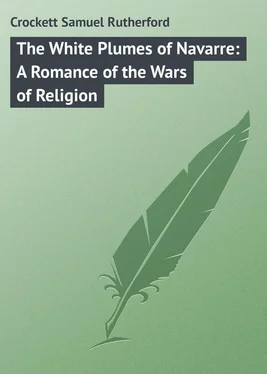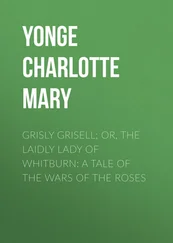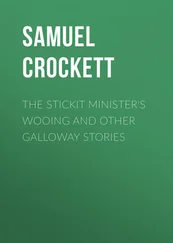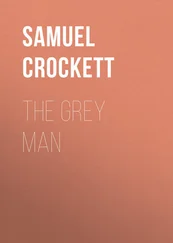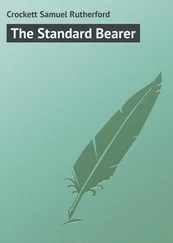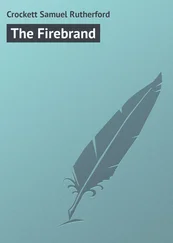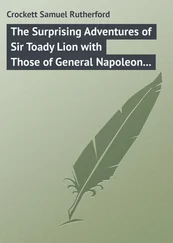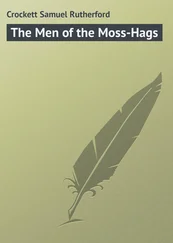Samuel Crockett - The White Plumes of Navarre - A Romance of the Wars of Religion
Здесь есть возможность читать онлайн «Samuel Crockett - The White Plumes of Navarre - A Romance of the Wars of Religion» — ознакомительный отрывок электронной книги совершенно бесплатно, а после прочтения отрывка купить полную версию. В некоторых случаях можно слушать аудио, скачать через торрент в формате fb2 и присутствует краткое содержание. ISBN: , Жанр: foreign_prose, на английском языке. Описание произведения, (предисловие) а так же отзывы посетителей доступны на портале библиотеки ЛибКат.
- Название:The White Plumes of Navarre: A Romance of the Wars of Religion
- Автор:
- Жанр:
- Год:неизвестен
- ISBN:http://www.gutenberg.org/ebooks/33215
- Рейтинг книги:3 / 5. Голосов: 1
-
Избранное:Добавить в избранное
- Отзывы:
-
Ваша оценка:
- 60
- 1
- 2
- 3
- 4
- 5
The White Plumes of Navarre: A Romance of the Wars of Religion: краткое содержание, описание и аннотация
Предлагаем к чтению аннотацию, описание, краткое содержание или предисловие (зависит от того, что написал сам автор книги «The White Plumes of Navarre: A Romance of the Wars of Religion»). Если вы не нашли необходимую информацию о книге — напишите в комментариях, мы постараемся отыскать её.
The White Plumes of Navarre: A Romance of the Wars of Religion — читать онлайн ознакомительный отрывок
Ниже представлен текст книги, разбитый по страницам. Система сохранения места последней прочитанной страницы, позволяет с удобством читать онлайн бесплатно книгу «The White Plumes of Navarre: A Romance of the Wars of Religion», без необходимости каждый раз заново искать на чём Вы остановились. Поставьте закладку, и сможете в любой момент перейти на страницу, на которой закончили чтение.
Интервал:
Закладка:
Then from the midst of the little crowd there came one forth, the finest and properest man Claire had ever seen. He was tall and magnificently arrayed. The cloak over his light chain-armour was of dark crimson and gold, and the six enamelled lilies on his helmet marked him as next in rank to the princes of the blood.
The cavaliers about him drew their swords, and after saluting, asked if it were the will of their Lord Duke that they should punish these caitiffs who had so battered Goulard and Moulinet.
But "My Lord" put them aside with an impatient gesture of his glove.
"It would have served Goulard and Moulinet right if they had gotten twice as much!" he said. "They meddled in what did not concern them."
All the same, as he rode forward, his eyebrows, which were thick and barred across, twitched threateningly. He threw off his crimson cloak with an impatient gesture, and suddenly shone forth in a dazzling array of steel breast-plate and chain armour, all worked and damascened with gold.
"Epernon – Epernon – for my life, Epernon!" muttered the Abbé John under his breath to the Professor of Eloquence; "we could not have fallen on worse!"
The King's reigning favourite and boldest soldier rode straight up to them, with the careless ease which became the handsomest man in the kingdoms of France and Navarre.
"What have we here?" he demanded. "A pretty girl, two holy men, and a scarecrow! You are Genevists – Calvin's folk – Huguenots! This will not do; a fair maid's place is in a king's court. I will escort her thither. My wife will have great pleasure in her society, and will make her one of her own or of the Queen's maids-of-honour. From what I hear, her elder Majesty hath great need of such!"
"Not more than His Majesty has need of men of honour about him," cried the Abbé John fiercely – "aye, and has had all his life!"
"Hola, young cock-sparrow, clad in the habit of the hoodie-crow!" said D'Epernon, turning upon him, "from what stable-heap do you come that you chirp so loud?"
"From that same heap on which you serve as stable-boy, my Lord Duke!" said the Abbé John.
The Duke's brow darkened. He put his hand quickly to his gold-hilted rapier.
"Ah, pray do," sneered the Abbé John; "follow your inclination. Let the bright steel out. Get a man to hold our horses, and – have at you, my good Gascon!"
By this time the Duke d'Epernon's gentlemen were spurring angrily forward, but he halted them with a wave of his hand, without turning round in his saddle or taking his eyes off John's face.
"What is your name?" he demanded, his brows twitching so quickly that the eye could scarce follow their movements.
"I am John d'Albret, nephew of the Cardinal Bourbon and – "
"Cousin of the Bearnais?" sneered the Duke, his eye glittering.
"Student at the Sorbonne!" said the Abbé John firmly. "All the same, if clerk I am, I am no poor clerk, and so you will find me – if, waiving my royal blood, I consent to put my steel to yours upon the sward. Come, down with you – and fall on!"
Now the Duke d'Epernon was anything rather than a coward. He made a motion as if to dismount, and there is little doubt but that his intention was to match his long-trained skill and success as a swordsman against the Abbé John's mastery of the latest science of sword-play learned in the Paris salles .
But suddenly D'Epernon checked himself. Then he laughed.
"No," he said; "after all, why should we fight? We may need each other one day, and there is no honour in killing a bantam, even if he hath a left-hand strain of kingly blood in him!"
"Left-hand!" cried the Abbé John: "you lie in your throat. My blood is infinitely more dexter than your own, and I make a better use of it! I am no mignon, at least."
Now this was a bitter taunt indeed, and even the tanned face of the King's warlike favourite flushed.
"As to mignons," he said, "you look much more like one yourself, young cockerel. I have overly many scars on my cheeks for the trade. And this is, I presume, your sister – to judge by the resemblance?" The Duke turned to Claire, who had been looking at him with a certain involuntary admiration. "What, no? Your niece, you say, my good Sorbonnist? I am not sure but that, as a strict Catholic, I must object. The age is scarce canonical!"
"I am no priest," said Doctor Anatole, roughly, for this touched him on the raw. "I am only the Professor of Eloquence attached to the faculty of philosophy. And I have the honour to inform you that I travel with my niece, to put her under the care of my mother at her house near to Collioure, in Roussillon."
"What!" cried the Duke, "now here is another of the suspicions which awake in the mind of the most guileless of men. Here we have a Bourbon, next-of-kin to the Cardinal himself, together with a Professor of the Sorbonne (that hotbed of sedition), travelling towards the dominions of the Demon of the South – of Philip of Spain! As a good subject, how am I to know that you are not on your way to stir up another rebellion against the King my master?"
It was then that Claire spoke for the first time.
"Sir," she said quietly, but looking full at the Duke with her eyes – dark green eyes the colour of jade, with little golden flashlets floating about in them, "I vouch for my friends. They are loyal and peaceful; I who speak am the only Huguenot. You can take and burn me if you like!"
The great Duke d'Epernon stood a moment aghast, as if the hunted hare had turned upon him in defiance. Then he slid off his helmet, and saluted, bareheaded.
" Ma belle damoselle ," he said, "you may be the niece of a Doctor of the Sorbonne and at the same time a Huguenot. These are good reasons enough for carrying you to the castle of His Majesty. But be comforted – we are not as Philip of Spain, our enemy. We do not burn pretty brave maids such as you!"
It was then that Jean-aux-Choux forced himself forward on his big, blundering Spanish mare, driving between a couple of cavaliers, and sending them right and left like ninepins.
"Great Duke," he said, "you would do well to let us go on our way. You talk much of His Majesty – I ask you which. You have served the 'Bearnais' – you will serve him again. Even now you have cast an anchor to windward. It sticks firmly in the camp of the Bearnais, not far from that King's tent."
Duke d'Epernon turned on Jean-aux-Choux his fierce, dark eyes.
"It seems to me that I have seen you before, my churl of the carroty locks," he said; "were you not at the King's last fooling in the Louvre?"
"Aye," said Jean, "that I was, and in a certain window-seat behind a certain curtain I gave your Dukeship a certain letter – "
"It is enough," muttered the Duke, waving his hand hastily. "I am on my way to Angoulême, which is my government. Come all of you with me to Blois, and there abide quietly in a house till I return to salute the King. The Estates meet in the late autumn, and if things go as it seems likely after this Day of the Barricades, we may need your blood royal, my excellent Clerk d'Albret – your best wisdom, my good and eloquent Professor – your rarest quips, my merry scarecrow – and, as for you, little lady, my newly-wed wife Marguerite will not be sorry to have a companion so frank and charming among the fading blossoms and over-ripe fruit of the court of the Queen-mother!"
"My lord," said the Professor, "I fear that I have not time to wait upon the King. I must go to visit my mother, and carry this maid with me!"
The Duke smiled.
"I am not demanding your learned preferences, most eloquent Professor," he said; "I am taking you into safe keeping in the name of the King. After all, I am not an ignorant man, and I know well that it was a certain Doctor Anatole Long who, in the full concourse of the Sorbonne, voted alone for the rights of the Valois. Give the King, therefore, a chance of voicing his thanks. Also, since the King is at Chartres and I must speed to Angoulême, I will leave you at Blois in good and comfortable keeping with the young damsel, your niece, taking with me only this young man, that he may see some good Leaguer fighting. He hath been, I dare say, on the Barricades himself. It is permitted to his age to be foolish. But he has never yet seen a full-grown, raw-hide, unwashen Catholic Leaguer. Let him come to Angoulême with me, and I will warrant to improve his sword-play for him! Close up, gentlemen of my guard! To Blois! Ride, accommodating your pace to mine, as I shall do mine to that of the palfrey of the new lady companion of Marguerite of Foix, whom I have the honour to love!"
Читать дальшеИнтервал:
Закладка:
Похожие книги на «The White Plumes of Navarre: A Romance of the Wars of Religion»
Представляем Вашему вниманию похожие книги на «The White Plumes of Navarre: A Romance of the Wars of Religion» списком для выбора. Мы отобрали схожую по названию и смыслу литературу в надежде предоставить читателям больше вариантов отыскать новые, интересные, ещё непрочитанные произведения.
Обсуждение, отзывы о книге «The White Plumes of Navarre: A Romance of the Wars of Religion» и просто собственные мнения читателей. Оставьте ваши комментарии, напишите, что Вы думаете о произведении, его смысле или главных героях. Укажите что конкретно понравилось, а что нет, и почему Вы так считаете.
